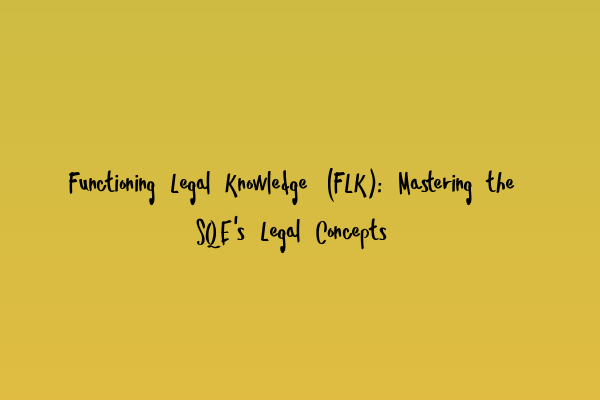Functioning Legal Knowledge (FLK): Mastering the SQE’s Legal Concepts
If you are aspiring to become a solicitor in England and Wales, you must be well-versed in the concept of Functioning Legal Knowledge (FLK). FLK is a crucial component of the Solicitors Qualifying Examination (SQE), which has replaced the old system of qualification for solicitors in these jurisdictions. In this blog post, we will explore the significance of FLK and provide you with some tips on how to master the SQE’s legal concepts.
So, what exactly is FLK? FLK refers to your ability to understand and apply legal concepts in real-world scenarios. It is not just about rote memorization of legal principles; rather, it requires you to analyze and interpret legal issues and apply them to practical situations. FLK is designed to test your critical thinking and problem-solving abilities, which are essential skills for any solicitor.
Now, let’s delve into some strategies to help you master the legal concepts tested in the SQE.
1. Understand the core topics: The SQE covers various legal areas, such as contract law, criminal law, property law, and more. Familiarize yourself with the core topics and ensure you have a solid foundation of knowledge in each area. Understanding the underlying principles will make it easier to grasp the application of these concepts in different scenarios.
Tip: Use online resources, textbooks, and study guides to gain a comprehensive understanding of the core legal topics.
2. Practice case analysis: The SQE assesses your ability to analyze and apply legal principles to real-life scenarios. Practice analyzing case studies and identifying the relevant legal issues at hand. Develop the skill to spot the key facts, identify the applicable laws, and provide a well-reasoned analysis of the legal outcome. The more you practice, the better you will become at applying legal concepts to complex scenarios.
Tip: Join study groups or engage in online discussions to practice case analysis with fellow aspiring solicitors.
3. Review past exam papers: Familiarize yourself with the format and style of the SQE exams by reviewing past papers. This will give you insight into the types of questions you can expect and help you identify any knowledge gaps. Pay attention to the keywords and phrases used in the questions, as they can provide valuable clues on what the examiners are looking for in your answers.
Tip: Create a study schedule to ensure you allocate enough time to review past exam papers and practice answering questions within the allocated time limits.
4. Develop legal research skills: As a solicitor, you will often need to conduct legal research to support your arguments and advice. Familiarize yourself with legal databases, such as Westlaw or LexisNexis, and practice using them to find relevant case law, legislation, and commentary. Developing efficient legal research skills will not only help you in the SQE but also in your future legal career.
Tip: Take advantage of any free trials or subscriptions offered by legal research platforms to gain hands-on experience.
5. Seek guidance from experienced professionals: Learning from those who have already mastered the legal concepts tested in the SQE can provide valuable insights and guidance. Seek out mentors, join professional associations, and attend networking events to connect with solicitors who can share their experiences and offer advice on how to excel in the examination.
Tip: Consider reaching out to solicitors in your desired practice area for tailored guidance and industry-specific insights.
In conclusion, mastering the legal concepts tested in the SQE requires more than just memorization. It demands a deeper understanding of core legal topics, critical thinking skills, and the ability to apply legal principles to real-world scenarios. By following the strategies outlined in this blog post, you can improve your Functioning Legal Knowledge and increase your chances of success in the SQE examination.

Leave a Reply